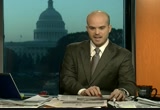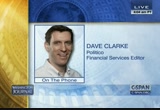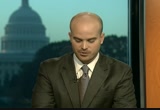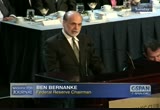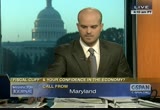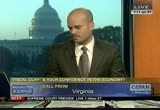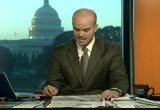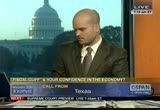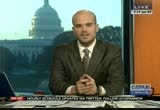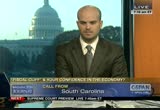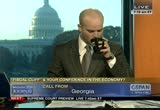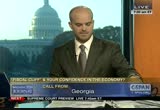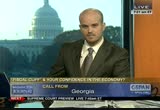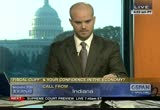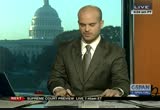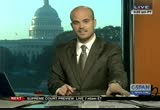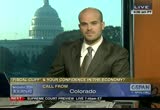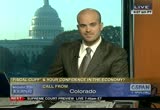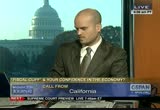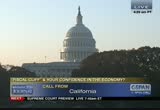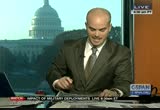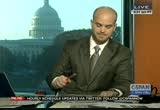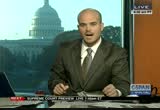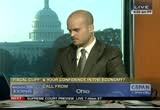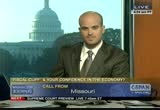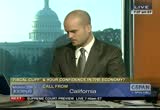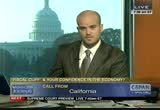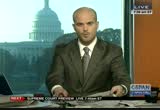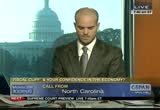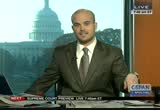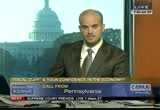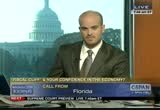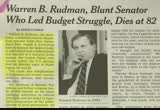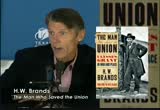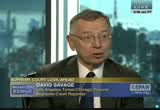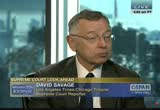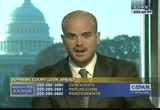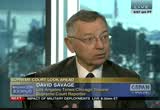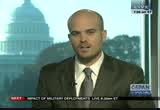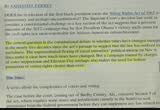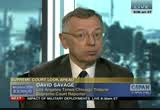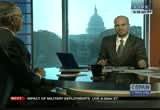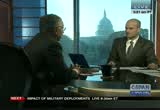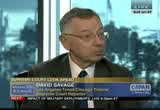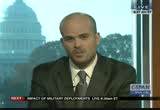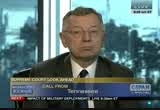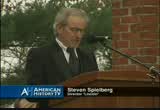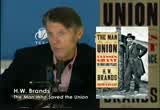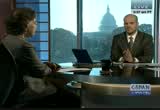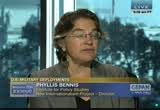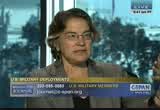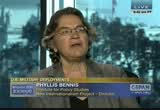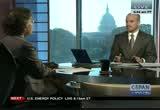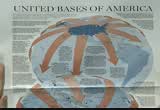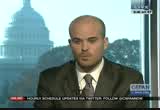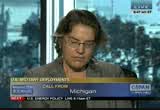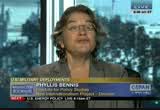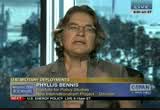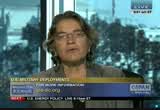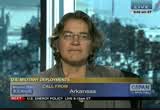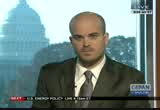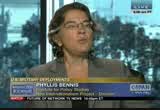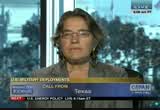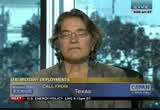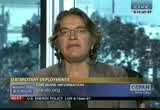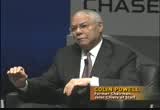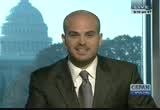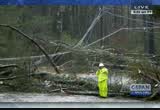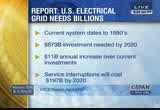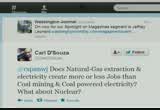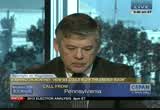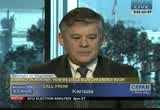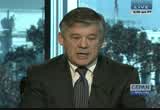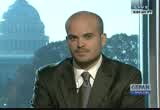tv Washington Journal CSPAN November 21, 2012 7:00am-10:00am EST
7:00 am
we will talk about the effected military deployments. we will be joined to discuss the article about the energy boom. "washington journal" next. host: good morning, it's wednesday, november 21. president obama returns to the white house this afternoon following his tour of asia. secretary clinton is on the ground in the mideast, meeting with israeli, egyptian, and palestinian officials in an effort to bring an end to the ongoing violence in the gaza strip. yesterday's fed chairman ben bernanke issued warnings to u.s. leaders negotiating over the so- called fiscal cliff about the serious financial impact looming on the horizon.
7:01 am
that's where we begin this morning. how confident are you about the state of the u.s. economy? what steps are you taking to prepare for the potential impact if the u.s. goes off the fiscal cliff? give us a call this morning. you can also catch up with us on all your favorite social media sites, twitter or facebook. or e-mail us. thismorning to you on wednesday, november 21. we are talking about federal reserve chairman ben bernanke's comments yesterday about the fiscal cliff, and getting your thoughts on bthe u.s. economy.
7:03 am
to tell little bit more about ben bernanke's , and sister day we turn to david clarke of "politico," their financial services editor. thanks for joining us. guest: thanks for having me. host: what is making the most waves from his speech? guest: in the past he has warned that congress and the president's path to take care of the fiscal cliff. yesterday he said it is not simply doing it but how they do it, making a point that voters will be looking to see if they can do this in a cooperative manner, whether it would be chaotic. it would be important to see
7:04 am
that leaders can tackle the big problem and it does not run up against the deadline. a lot of people noticing that he said it's not just that doing this will prevent something bad from happening but that if congress and the president can resolve this quickly and look like they can do it in a cooperative way, it could be a fairly big boom to the economy next year. host: is the headline in the daily news today -- was there a reading between the lines, a sense of optimism in his remarks that this could get done? guest: no. the market reacted negatively to his comments. it's tough to read into exactly what is setting off the stock market. in the previous few days after
7:05 am
president obama and congressional officials said that they had had constructive talks, that seemed to spark some confidence in investors. ben bernanke's speech yesterday- in that -- more negative and that scare investors. i don't think there's been a lot of substance getting accomplished. it would not surprise me they would come out to say this was constructive when the only real goal was to meet chance a eloped in advance of these talks. host: talk about ben bernanke's role in this issue from here on out. a little fog of st. journal story this morning -- -- a little from the wall street journal --
7:06 am
talk about his role from here on out? guest: with regard to the fiscal cliff, his goal is applying pressure from the al outside. he will not be a part of the negotiating process. as the chairman of the fed, his comments get a lot of attention. as far as the talks, he is trying to sound a warning that if you don't do something on this, it is going to be bad for the economy and we will possibly head into a recession next year if a deal is not struck late this year or sometime early next year. what the fed has been doing in order to try to slow and
7:07 am
employment and help the economy the past two years is the bond buying program. the goal is to keep long-term interest rates low in hopes it will spur lending, which will help the economy along. the fed was pretty clear two meetings ago that it will keep doing that until it believes the economy is growing at a great. the expectation seems to be that when one round of the bond buying programs ends at the end of december, but they will keep doing it. but they have to make that formal decision after meeting in december. host: we are asking viewers today to ask how they are preparing if the u.s. does go off the fiscal cliff. did ben bernanke say anything yesterday about what he could do if the u.s. goes off a cliff in january? guest: he was pretty clear that
7:08 am
the fed is doing what it can do now. whatever damaged baby caused by the fiscal cliff, the fed is really going -- is not going to be able to offset that much. it is doing what it can now. if congress does something to make the economy worse, the fed will do whatever it can. it will not have the power to do much to offset whatever damage is done by going off the fiscal cliff. host: thanks so much for joining us this morning. guest: thank you. host: we want to play a few of ben bernanke's comments from yesterday. [video clip] >> the federal budget is on an unsustainable path. the budget deficit which peaked at about 10% of gdp in 2009 and now is 7% of gdp is expected to narrow further in the coming years as the economy continues to recover.
7:09 am
the cbo projects that under a plausible set of assumptions, the budget deficit would still be greater than 4% of gdp in 2018, assuming the economy has returned with potential by then. moreover, under the cbo projection, could deficit and raise your federal debt to gdp would subsequently returned to an upward trend. we should all understand that long-term projections of ever increasing deficits will never actually come to pass because the willingness of plunder to continue to fund the government can only be sustained by irresponsible fiscal plans and actions. host: that was ben bernanke at the economic club of new york yesterday. looking for your confidence in the u.s. economy. already getting some comments on facebook -- abroad
7:10 am
we are taking your comments on twitter, facebook, and calls. we start with joseph from maryland on the democratic line. thanks for joining us. caller: good morning. the issue is -- there are multiple variables. it's not just the fiscal cliff. our economy is interdependent, we are dependent on europe and china and those economies are
7:11 am
slowing down. inevitably, there is going to be job losses and those losses will lead to fragment. then there's the fiscal cliff. some countries will realize if we don't stop borrowing or start paying off the debt, they will stop lending. i think i agree with bernanke. i don't know if we can truly prepare if it's going to happen, as individual people. some people live paycheck to paycheck. those people might not be able to do well if that does happen. host: we will go to frankie on the republican line from virginia. thanks for joining us. caller: yes, as far as the fiscal cliff, i was wondering about maybe raising taxes. q. what are they planning on
7:12 am
cutting? i live paycheck to paycheck. i was curious as to what people are planning on cutting instead of just raising taxes? host: you said you are living paycheck to paycheck. are you doing anything to prepare in case the u.s. goes off the fiscal cliff? caller: just try to work to make a living. this economy is not helping much. host: thank you. today's wall street journal talks a little bit about the impact of going off the fiscal cliff in this chart --
7:14 am
we will take you through few more those scenarios throughout the show. but we want to go to jeff from texas, the independent line. your confidence in the u.s. economy as we are approaching this fiscal cliff. caller: yes, thank you. i don't see much confidence. i don't see the fiscal cliff as the big problem. the problem is the federal reserve monetary policy. the idea that the weekend keep printing money and borrowing money and expect the government to carry everything. we are buying up all these bonds and keeping interest rates so low. politicians from both parties are telling us we need to cut spending a little and raise little.
7:15 am
we need to save the dollar to save our country from going into hyperinflation or hitting another depression, the likes of which we have never seen before. we must cut spending drastically across the board. we cannot have entitlement welfare/or fair. we have to have a sound currency that actually has value planned instead of just relying on everybody accepting the dollar. china and saudi arabia are talking about protecting the u.s. dollar, so we cannot have that. we have to have a sound monetary policy and stop letting international bankers control the stocks of our centralized banking system and adjusts let the people use currency that has an actual value. host: on twitter --
7:16 am
7:17 am
7:18 am
line. anything you are doing to prepare for this looming fiscal cliff if the u.s. goes off it? caller: i will probably get a hold of james cliburn and give my opinion, which i will give to you. host: that is your congressman? caller: yes. john boehner and nancy pelosi need to get together, organized all the votes they need to pass the bill that is already passed through the senate, which is the 250,000 and below, maintain the bush tax cuts. if they did that and went ahead and passed that bill, that would put the issue of the other foot -- the shoe on the other foot in regard to congress would show good faith in the effort to avoid the fiscal cliff. that would force the democrats to seriously look at fiscal
7:19 am
reduction. it would demonstrate the fairness aspect of the rich paying a little more. but it would force the democrats to seriously look at entitlements. this could really be a big step in avoiding the fiscal cliff and would give confidence, makes for a good holiday season. it is the thing to do. john boehner and nancy pelosi need to get together, get the votes, and pass the senate bill. host: i want to take you to the republican line. pat in richmond hill, georgia. caller: good morning. yes, overall, in the long term, i have a lot of confidence in
7:20 am
the u.s. economy. short-term, as a small-business owner, i talked to my customers quite a bit. it comes down to dividing lines. it is the difference between the private sector, as a small- business owner, everything is a penny, and sometimes the public sector waste other people's money. that's the big division in the country right now. the recent vote proves that it is. how much preparing? if we go over the cliff and taxes increase, i am out the door -- i will lock the host: doors what is your business? caller: a pizza business. it probably is one that should be inflation-proof, because people have to eat and it is comfort food. it is just the competition, the taxes, insurance is so high that it's become very difficult
7:21 am
for small business owner even in this business to really make a profit. host: you might have to lock your doors if this is not solved by january 1? caller: i would consider it. if taxes go up and spending slows down, and i am in an area that has sent pizza parlors, i would hate to do that because i would put 15 people into unemployment that will not show on the rolls, because they're not full-time employees. prior to owning this business, i was selling small business services in the savannah area, which is a growing area of the country and the same sentiment was across the board. people feel like what are they doing, they are working, sacrificing their friends,, family, vacations. no benefits for very little profits. the small business owner is the backbone of the country. most people i talk with feel we
7:22 am
are getting crapped on. i hate to close the doors. but if i had to end it would bring some peace to my family, i probably would do it. but now we are working very hard. it's not just me. it is my wife and the people around me that own small businesses. host: sea of tranquillity -- here's a story from the wall street journal --
7:23 am
7:24 am
the main question is people need to be completely ready. [indiscernible] there's no one coming to save you. this government is completely the fault. it's not going to work itself out. ben bernanke cannot do anything to help us. they continue to print money, which takes more money out of your pocket, which makes you work harder so you cannot pay attention to what they are doing. i recommend everybody pay attention to what you are doing. host: i appreciate the call this morning. a few more those scenarios from the wall street journal graphics in today's paper that you can check out on page a6.
7:25 am
7:26 am
ena is waiting to chat with us. caller: good morning. what i am doing to prepare for going over the cliff is to educate the public. i have before me an article in the denver post in 1992 and it shows a graph from 1978 to 1992 years, reagan,2 bush, and their policies carried on a class warfare against middle-income working families to benefit the wealthiest people in society. they added 1.1 trillion dollars to the national debt. incomes of the rich soared during the 1980's while the middle class struggle to keep its existing standard of living or lost ground. working americans are paying more in taxes, receiving fewer
7:27 am
government benefits, and experiencing a stagnant or dropping in crumbs, says richard gephardt. the rich are getting richer and contributing fewer resources to the finances of government. host: as you look back on that, take us forward to today. caller: the tax cuts under george bush -- george w. bush, add another $1.20 trillion. these have all been coming forward and get the blame obama. the rich have had all the benefits. i was a business owner. we had 182 employees. i did not have to close my door is. host: what was your business? caller: i went for your without a paycheck. we had a family business we started from scratch, my husband and i, in 1949. i don't see any excuse for these people. i hear the same line. it must've been written for them
7:28 am
by someone else, that they will close their doors. it's time we call the bluff of the republican party and say that, we know you are for the 1% because they are the one who finances you, but we have a right to own home, to food, to health care. they can cut the salaries of the hmo executives. in 1966 steve took millions out of oxford health plan and history of dealings took another $100 million. host: now to the republican line from california, ron waiting to talk to us. caller: good morning. good job. the issues are occluded. the whole congress -- i blame the entire congress for holding americans hostage for this
7:29 am
results. this is not space science. we're not trying to go to pluto. we are trying to fix something of a vote of 425 people we have to convince. this is ridiculous. the price of health care is doubling as a first of the year. that has nothing to do with the fiscal cliff. that is congress not paying attention to what's going on with health care. they are blaming obamacare on this, but this was before the election the price of health care was going up. across the board, we are not dealing with problems at hand. both sides of the aisle, those that don't want to give an answer to this before we go over the fiscal cliff, they're not responding to the will of the people. they will be voted out. there's no doubt. if we have some very lovely and caring republicans that are very
7:30 am
conservative and we love them, but we will vote them out if they don't fix this. we are holding them responsible as we are holding the democrats. host: thanks for the call. we will continue discussing the fiscal cliff and taking your calls. we want to point out some other news going on in the world. here's the front page of the boston globe this morning -- clinton was dispatched by president obama to israel and is meeting today with egyptian officials and palestinian officials as well. the headline from the tribune --
7:31 am
7:32 am
one story this morning, some breaking news from jerusalem. this is according to a dap. really rescue services said there have been explosions on a bus across the military headquarters in tel aviv. the agency says at least 10 people were injured in wednesday's blast. the explosion comes amid an ongoing israeli operation rollers.aza's hamas so, more information on that incident probably coming later today. but we are taking your calls this morning on your confidence in the economy, your thoughts on the fiscal cliff, and how you are preparing for that.
7:33 am
marc is from 0 highfill on our independent line. -- from ohio. caller: good morning. i'm a person who believes we need to do something radical, which a lot of people don't want to hear that word, but sometimes it is necessary. the radical movement that i see is something ron paul, the only really good candidate they had, suggested. that is to get rid of the federal reserve. they are not supposed to be doing what they are doing at all. they were put into power way back when as an emergency and then board kept there. that was a mistake. these guys are wealthy, i paid individuals. just think how much money would go towards the deficit if congress took their job over the, the way they are supposed to be doing and stop this
7:34 am
blitzed that may be coming? host: we will go now to darrell from defiance, missouri, on the democratic line. thanks for calling. caller: thanks for having me. it's no wonder we are going off the fiscal cliff. i wonder how many americans know we'll build 45 military bases surrounding iran. it's funny that our media in this country and is packed with a cowards that never tell us the truth about anything. we are supporting israel. that's the no. 1 terrorist nation on the planet. sometimes i think they have our congress people in this country brainwashed. host: what are you doing personally to prepare for the fiscal cliff? are you changing your finances or how you manage your money? caller: no, just storing up on the things i need when it all
7:35 am
7:36 am
7:37 am
we are taking your calls on your confidence in the economy this morning and the looming fiscal cliff. dre is in los angeles, california, on the republican line. caller: thank you and thank you for c-span. the problem the country has and that we have seen is the astronomical population growth that we are seeing. this population is definitely not going to be able to be taken care of with social service dreams of this administration. it is too much money and too many people. we need to get back to industry, where this country was 100 years ago, 60 years ago, big business, big industry. let's start exporting. let's start getting people that
7:38 am
are importing like china, let's put a tariff on imports and start making money. if they want to sell goods here, we should tax those goods. the woman from colorado, with all due respect, was a people who make money and become wealthy, they do pay their share of taxes. my folks were very wealthy. my mother would spend days and days each fiscal quarter doing taxes. they paid half of their income in taxes. what i am saying is she wanted to call a bluff on the rich. it was called. no homes are being built. billions and billions of dollars remain overseas. [indiscernible]
7:39 am
7:40 am
how are you prepared for the possible ramifications of going off the fiscal cliff? caller: hi, good morning. i am preparing by checking the backgrounds of what is really causing the problem. a few years ago in texas the bush boys were on the board of the silverado bank which went belly up. they then paid off the tax bill and raise the taxes on everybody in america. following that, the new york stock exchange went belly up and the taxes were increased to cover that, too. now we have another flip-flop going on about going over the
7:41 am
fiscal cliff. we need to go back and figure out where it started, which was in texas with that silverado bank that started the rko. from let's go to dave pennsylvania on the democratic line. thanks for calling. caller: yes. i have a lot of confidence in the economy. i am in southwest pennsylvania, south of pittsburg. in the last three and a half years we have had 3000 national gas wells drilled. the gas is here right now. a multibillion-dollar ethylene plant has been billed by shell. u.s. steel has a $3 billion expansion coming in. i propose, for 40 years they have blackmailed us. any oil that is exported out of
7:42 am
the country should be taxed. it will not be any detriment to our country. if the other people don't want to pay it, we will keep it for ourselves. host: we will be talking about shale gas in the later segment. are you concerned congress and the white house will deadlock and mess up this process for you, that you see so much optimism in? caller: women suffrage since january 19 -- we have been suffering since january 1981, we could suffer a little longer. but we know what works. the tax rates under bill clinton, and you have to put the glass-steagall back in order to put the competition back into our capitalistic system. that would put us on a level playing field can and everybody would go back to competing and getting people back to work. host: richard is next, also from
7:43 am
pennsylvania, but on our independent line. thanks for calling. caller: thanks for taking my call. i am just buying supplies to keep my family safe. the fiscal cliff, taxes are not the problem. the banking system is the problem. when clinton was in office, people paid higher taxes. since bush and obama, everybody's paying lower taxes. you have to reinstate glass- steagall. we have $40 trillion in american business overseas. they're not going to keep them in the u.s. banks. give these people to keep tax rates and put the money back into the banks and this problem would be solved. right now they're grabbing the american people's money. until people realize the banking system is the problem, we will keep going around in circles
7:44 am
until people realize what the real problem is. host: johnny from pensacola, florida, on the democratic line. go ahead. caller: i want to speak on the fiscal cliff. who controls the fiscal cliff? is it congress? host: there are ongoing negotiations over the various fiscal policies that need to be changed between congress and the white house, burt congress makes -- but congress is the one who makes the laws. caller: president obama could not put anything in there before his term going out. i have been following this for years. usually the incoming president
7:45 am
has bills that the previous president left. on this president's way out, congress would not let him put any deals in. they put enough in there to finish his term. host: the president has been reelected and will be back in next year. but i appreciate the call. i want to point to an obituary in the new york times today on the death of warren redmon. he dies at age 82. the sometimes combative centrist republican senator from new hampshire.
7:46 am
you will be seeing those obituaries in several papers today. coming up next, a top supreme court reporter david savage will join us to talk about some of that the-profile cases an accord will be taking up. and later, phyllis bennis will take a closer look at where u.s. troops are deployed around the world, and not just in the middle east. first, turning back to warren rudman. he was a moderate republican senator from new hampshire. he was 82 years old when he died. he sat down with c-span in may of 1991 to discuss his life and his career. [video clip] >> a senator from the neighboring state of maine says you have the manner of a drill instructor and the mind of a general. but i would argue with that. i am too brusque sometimes.
7:47 am
i'm in a hurry. it's not really a discourtesy. i am just in a hurry. i'm not trying to roll over people. i've been patient. bill is right. he's a very good man with words. i don't disagree with him. >> is the brusqueness of new england trade? >> some of us have it and some of us don't. it's not unfriendly. let's get down to what you want to talk about it. do you agree or disagree, or what have you? what have you? >> several people have described uva as someone known for his ferocious honesty and absolute integrity. how important is that to you, integrity? >> not even a close second. it is the most important thing to me.
7:48 am
as a kid growing up it was the most important. important to my family. important to be in the service. very important to me as attorney general of new hampshire. and extremely important as u.s. senator. it is more important than anything else. [video clip] >> there are many people who might even take issue which the grant saving the union during the civil war. did lincoln not do that? i'm not going to say grant was the only person to save the union, but he was the commanding general of the armies that could lincoln's policies into effect. and he was the general who accepted the surrender of property lee's army. if anybody wants a war on the battlefield, if you could say iny one person deid -- history, we generalize, because reality is too complicated to
7:49 am
get our heads around, if we deal with it in its full complexity. so grant saved the union during the civil war. i do contend that grants saved the union during the construction as well. >> to 1600 pennsylvania avenue, the life of the ulysses grant. thursday night at 10:15 eastern, part of the holiday weekend, starting this thursday on c- span2. >> "washington journal" continues. host: a look ahead at what the supreme court will be doing in the coming months will david savage of the los angeles time. you wrote this month that this year's court term is said to be a momentous one for civil rights. what is on tap for the supreme court? guest: college and affirmative
7:50 am
action. the voting rights act, the part that affects the south. and next week, gay marriage, the court as a bunch of appeals to take on the gay marriage question. those are three pretty good ones. host: political through them one at a time. the voting rights act was picked up by the supreme court justice couple days after the election. guest: correct. this is a little like the affirmative action question. civil-rights remedies from the '60s and the question is, is it still needed today? part of the voting rights act in 1965 outlawed racial discrimination in voting but it also put most of the south under a sort of federal scrutiny, which basically said if you are a small county in alabama or a city and you want to exchange your election laws or voting laws, you have to basically get it cleared ahead of time in washington and send some sort of form to the justice department to explain what you are going to
7:51 am
do or you could go to a federal court. the theory was for 100 years, even though racial discrimination had been outlawed by the 15th amendment, a lot of cities and towns that control the voter rolls had various schemes that prevented blacks from registering to vote, so the federal government -- this is an unusual lot to say we are going to put the whole part of the country under special scrutiny of the federal courts -- that law still exists. the dissected by the voting rights act. it still is the case, if texas wants to change its congressional districts or have a new voter id laws. the networks -- a need to get it cleared from washington. host: how many states are we talking? guest: there are nine states, i think, covered by the law. the formula, i can tell you the simple part of it.
7:52 am
it is the deep south. from there it gets very complicated. there are five counties in florida, not the other 62 counties. there are some counties in california and new york. if in the early 1970's congress updated the law a little to take into account areas that had spanish-speaking or non english- speaking voters who were not registered. there were brought under the law. they said you are doing a poor job of registering nine english- speaking voters. so there's a couple counties in california. and in new york. for the most part, the law is still as it was in 1965. host: congress approved this law for another 25 years recently? guest: absolutely. almost a unanimous vote. the senate passed it unanimously. i think the reason is this law was so important in american history. everybody agrees, even the people who don't criticize it today agree that the voting
7:53 am
rights act was one of the great civil rights laws of american history, because it really allowed minorities to register to vote and have their votes count. they could actually win seats in the city council or the county board. the only question now is, is it outdated? is it unfair to treat texas differently than ohio or south carolina different from indiana? that is the question the supreme court will take up. congress approved it. the conservative members of the court might be inclined to say this is a good law but its time is past and you can no longer put the deep south under this special scrutiny. host: we are talking with david savage of the l.a. times - -the chicago tribune, i should say. he's the supreme court reporter. if you have questions about the upcoming session of the court, give us a call.
7:54 am
the numbers are on the screen. before we leave the voting rights act case, who brought the case before the court? guest: shelby county, alabama. it is an unusual case in the sense that they are challenging it on its face. they did not have a particular case. they simply said that they believe this lot is unfair and outdated and they should not have to ask washington's permission before they changed the voting rights laws. so it is a challenge to the essence of the law. saying it is unconstitutional. host: the pending decision on college affirmative-action. when is that decision expected and what sense did you get this from the justices when the case was argued?
7:55 am
guest: we can never tell when they will decide the case. it's always hard to guess. if they are divided, it frequently takes many, many months. it could come late spring. if this order agree, it can happen pretty quickly. the case was argued in october. the issue is, in the past the supreme court has narrowly upheld college affirmative- action. it has done so on two premises. one is that racial diversity on campus is is really important. we don't want all white colleges and universities. very important to have minority students and have some diversity. and the only way to get there is to have some racial affirmative action. the case they taken up from the university of texas is different in one way. about 15 years ago the texas legislature passed a law that said if you graduate in the top 10% of your high school class,
7:56 am
and you are entitled to be admitted to the texas universities, including the university of texas in austin. battle all over 15 years has really changed the university. -- that law over 15 years. a third of the students now are hispanic or black coming in. almost all those students come in under the top 10% law. the reason it is important is justice kennedy, the middle vote on affirmative action, has always said something like i think there's a need for diversity on campus, but a race- based program should be the last resort, it should be the last option. so the question before the court in this case is, if texas has achieved a very good level of diversity using this top 10% plan with no preference is given to minority students, they got their own merits, they graduated in the top 10% of their class, can you have an
7:57 am
affirmative-action plan that considers race? texas wants to do both. a sense of the argument was there are five justices, conservative justices are inclined to rule against texas and the hard thing to date is whether they will issue a broad decision or in narrow decision. they could write a narrow opinion that's almost a texas- only case. passaic, texas, you achieve diversity, you cannot go further and have an affirmative action plan. they could write it border and say every state university in must try a race-neutral plan, must try something that brings in minority students without race. that would have a big impact. host: is this court more likely to issue a narrow opinions or the broader opinions? guest: it's hard to say. i've seen both. that's one of the things that's really hard to gauge, because you have five people sort of
7:58 am
agree on the result, but they disagree. with other disagree and so, that's one of the ones where my impression is that the justice kennedy would like to say something that is a little bit more narrow. some of the more conservative justices successfully a and thomas, have been very clear about this. -- justice scalia and justice thomas. e-ey say no rac affirmative action whatsoever. they say you cannot use race under equal protection of the law, so affirmative action is out. i don't think justice kennedy would want to go there. but i can imagine him writing a decision that would say, if you are university, you have to try other means to bring about diversity on campus before using race as one of the admissions factors. host: before we move on to some of the other cases, let's take a few calls.
7:59 am
henry is from new york, new york, on the democratic line. caller: thank you. on on the road right now interstate 40 just north of nashville, tennessee. [indiscernible] at decatur county, tennessee, my assertion is the issue of the brakes and the civil war is so passionate in this region. i will be brief. our civil war heritage, the calory in tennessee, the historical museum -- -- the valry. names wille people's fought in the cavalry. in other words, the issue and is
8:00 am
not dead in terms of passion and relative to bias. guest: some lawyers say things have changed and we don't have blatant racial discrimination like we had years before but they will tell you about a series of cases where things have happened in small towns and counties. for example, a black person looks like he will be elected to the county board and the board says we will change the voting rules so we will elect everyone at large rather than by district. in that case, you have to have more than 50% african-americans for an african-american to win a seat on the board. the impact of that would be to
8:01 am
prevent a black person from actually winning a seat on the county board. those kind of things don't happen often but every so often they do happen and the argument for the continuation of the voting rights act is the federal government should be able to stop that before those changes are made. host: you talk about justice kennedy being a key vote to watch. who are the key justices you are looking for on the voting rights act case? guest: it is almost exactly the same period is five more conservative justices, justice scalia, justice tom thomas, just as alito and the important ones, justice roberts and justice kennedy. the hard question for john roberts is what you mentioned early on -- i think john roberts would think there is something
8:02 am
wrong with keeping the south under this special scrutiny. the hard question here is congress did authorize -- re- authorize this law for another 25 years. kennedy and roberts, a one has addition they will have is to ask whether should the supreme court stepped in to strike down the law that congress has passed almost unanimously? host:
8:03 am
back to the phones, terry is waiting from pennsylvania on the republican line. caller: thank you, david, when you first started talking, you were talking about the election laws. you made the comment that the reason for the lobbying in active was the supreme court made the comment, i think it was california you said, that they were not doing a good enough job of getting non-english speaking voters to vote3 is that true? guest: yes, that was the issue in the early 1970's. it was the coverage formula which was changed. i don't know the history well but the issue then was that in a
8:04 am
lot of counties in different parts of the country including california there were language minority voters who were not registered and not voting. congress said we have been concerned about african- americans not registered in the south to vote. we want the states and counties to do better on that and we will also say the same about the counties that have not registered and voted qualified, eligible language minority voters so we will put them under this special scrutiny until they do better at registering language minority voters. host: did you have a follow-up question? caller: yes, that comment flies in the face of logic. in this country, in order to vote, you need to be a citizen. in order to be a citizen, you
8:05 am
have to speak english. guest: we are only talking about citizens. you're not eligible voter if you're not a citizen. this is a question of people who were citizens and were not registered to vote. i think it was a mechanical formula that looked at the percentage of what they call language-minorities who were registered to vote and sort of put the county under some scrutiny. nothing in particular happened to but they wanted those counties to do a better job of registering language minority voters. it was only citizens, not people who were not citizens. host: we're talking about the voting rights act face. this is from twitter -- let's go to steven from
8:06 am
columbia, maryland, on the democratic line. caller: thanks for taking the call. you answered my question about the argument for voting rights. are there any cases coming down the line that they will address more that are controversial state initiatives like the gay marriage or marijuana initiatives. here in maryland, we had the state college tuition for the kids of legal immigrants, thank you very much. guest: those are not at the court yet but the gay marriage question certainly is. next friday, the court has a series of pending appeals on the gay marriage question. two big issues -- one is the case of legally married gay
8:07 am
couples -- there are now nine states where gays and lesbians can legally marry. marriage is usually a state law matter but under the federal defense of marriage act, a law passed in 1996, the federal government does not recognize those marriages. in that situation, a gay couple who is legally married in boston, cannot file a joint tax return. they cannot get benefits under social security for their spouse like another merit couple would. a series of lawsuits have been filed a federal appeals court in boston and new york ruled tartabull law is unconstitutional. it denies gays and lesbians equal protection under the law. they are legally married. the court said they deserve the same legal rights. the obama administration would not defend that law. the house republicans appointed
8:08 am
john clement. many of those cases are under appeal and they will surely decide one of those cases this spring host: is there one more likely than the other? guest: that is an inside baseball question. the problem that arose is that elena kagan was the solicitor general when some of those cases were beginning and she mentioned at her confirmation hearings that she had participated in discussions about one of the cases. i think what the court wants to try to do is find a case where she came later and had no involvement. you want nine justices. they don't want age. you could get a split in the would not decide anything. host: she would be one of the key votes to watch? guest: when it is a close vote, every vote is a key vote. in answer to your question, there are several cases and it
8:09 am
is not a matter of a good or bad case. one of the deciding issues will be of justice kagan participated. when eight supreme court struck down an act of congress, they almost always hear the appeal. that law is constitutional in parts of the, -- country and unconstitutional in boston and new york so you cannot have that. the court will take up of those cases. host: the california prop 8 could come up as well? guest: that is a bigger question. that is the question of gays and lesbians having the right to marry. the last case was gays and lesbians being already legally marry. this is the first to get to the supreme court that directly opposed -- poses the question -- is unconstitutional -- is it
8:10 am
unconstitutional to ban the marriage of gays and lesbians? the federal judge in san francisco struck down below. the ninth circuit agreed on a two-one voter in the road a fairly narrow opinion but the question for the supreme court is -- they have several choices -- they could grant that case and decide in a big way whether denying the right to marry for gays and lesbians who violates the equal protection clause. they could take it up and decide it narrowly and say that is what the judges in the ninth circuit said. for a brief time, gates could mayor in california thanks to wasa state supreme court decision. the voters passed proposition 8 which took away that right and the ninth circuit said you cannot take away someone's rights. that was a narrow way to resolve the question. it is also possible that they might get together and for
8:11 am
different reasons the justices will say -- let's steer clear of this case and denied the appeal and in that case, gay marriage would then become legal in california but the supreme court will not have decided the question for all the other states. host: we are talking to david savage, the supreme court reporter for "the l.a. times" and chicago tribune. next is on the independent line. caller: thank you for having me. i am an african-american. and 48 years old. i had a comment regarding the upcoming affirmative action decision. in hindsight after looking at it for a long time, i see a lot of these programs that were instituted were insufficient. it has been shown that the beneficiaries of the program are
8:12 am
largely people who are african- american even though the good reporter mentioned african- americans several time when he was describing that particular decision. even when you mentioned the affirmative action in texas and how the top 10% are automatically eligible to attend any of those universities, the problem is, if the high school curriculums -- they are three years behind in the inner city schools -- you are setting people up for failure. as much as things change, the more they stay the same peri. we are stuck in a system where i don't have representation, where i am still blocked from economics, by ability, --
8:13 am
viability, so the struggle continues. host: how big is the scope of some of these cases? the caller brings a problems going back to the high school curriculum. as that, in any of the arguments with the supreme court? guest: yes, in the texas case, that was exactly the criticism of the top-10 plan when it was voiced in 1996. a lot of university officials said this will really not work because you will bring in kids from inner-city high schools. the rio grande area in south texas has a lot of mexican- american kids. they feared those kids would not do well but the encouraging news is that over the last 10-15 years, the graduation rate at the university of texas has gone up steadily and a lot of the
8:14 am
students coming in, black and hispanic, have done very well they did much better than you guessed based on their sats course. the use of -- the university put out several studies that said we have been heartened by the fact that students who worked hard and got good grades in high school may not have been at the top of the choice normally because of their s.a.t. scores but eventually did well. in the university of texas. the criticism is always or raised in these top 10% plans that it cannot work in many places but my understanding is from what people in texas say, it has worked pretty well at austin. host: from omaha, neb., on the democratic line. caller: thank you for having me. i called about the voting rights but that has been answered so i want to talk about affirmative action.
8:15 am
i know there are more than african-americans the benefit from it. i understand the top 10% automatically get into university in texas, however, is that overall for all of the high schools or just a tick -- -- or just particular i schools? if i put out an application that i am african-american or hispanic or whatever, without affirmative action being in place, with that effect my application? host: do you know the details of the case to that level? guest: i know some of the details. a federal appeals court had invalidated affirmative action in texas in the mid-1990s and that is how this program can about. it was a substitute for considering race. that is how it got under way and it is now about 3/4 of the class that comes in based on what is called automatic admits.
8:16 am
they have actually loaded to the top 8%. regardless of what i saw you go to in texas, if you graduate in the top 8% of your class, you could get into ut in austin. they set aside 1/4 of the class where the university has some discretion in and letting students and the university says that is where we want to consider a student race. we want to be able to consider those things. university officials say we need some discretion. if we get a kid was interested in architecture for outstanding in music, we want to be able to pick that kid if they are not in the top 10%. so, too, if we find a very talented african-american student or a latino student who is in the top 15% of a very good high-school in dallas or houston, we want to be able to admit that students. the university of texas is saying we want to consider race
8:17 am
sometimes and that is what the dispute is about. the critics say, no, it is wrong to consider race and you don't need to do it in this case. you've got a reasonable amount of racial diversity. host: let's turn to another case -- as you enter that, i will show that had line from "the wall street journal." answer to't know the that question. i think it would be unlikely, however. justice scalia is 76 and justice kennedy is 76. they are both generally on the right side of the court. justice ruth better ginsburg will be 80 in the spring. she is the oldest of the justices on the liberal side.
8:18 am
if you had to guess who was going to leave in the next four years, i think the standard guess would be justice ginsburg. it was very important for the ideological makeup of the court whether barack obama or mitt romney is president of united states because it justice ginsburg had left and another conservative justice came in, that could have changed the balance of the court. if, in the next four years, only justice ginsburg leaves, the presumption would be that president obama would pick somebody else who is relatively liberal and that the ideological balance of the court would not change. it would be a big deal if justice scalia or justice kennedy for one reason or another left and were replaced by obama -- an obama appointee. i would not bet on it. host: we are taking your calls on the supreme court in the near term and longer-term issues. john from texas on the
8:19 am
republican line is next. caller: good morning, i am very familiar with the hubbub about the affirmative action deal in texas. i'm a former teacher. we have an inconsistency in standards among our bicycles. students graduating from high year to year high schools are much better prepared for college than kids from the inner cities. what we found is that universities are admitting students who are not well qualified based on the affirmative action. they are finding that many of the students coming in under that role are failing. in their first year and not becoming good students. we want the affirmative action thing gone to where we only add that qualified students who have high s.a.t.'s, high grade point
8:20 am
averages, and score well on the texas standard tests and to demonstrated the probability of success at college. affirmative action is not working. we are getting poorer students through affirmative action that are not showing, once they graduate, that they are qualified students. host: how well did he wrap up the argument on the other side of this? guest: i -- i am unclear as to which students he is referring to. in texas, there are two types of students who come in. one is the group of students in the top 10% of a high school. it is not a particularly demanding high school, for example, it could be the criticism that those students are not prepared. the affirmative action policy of texas now only applies to
8:21 am
minority students who have a good test scores and they may not be in the top 10% of the plan but the university thinks they are very capable. i am not sure -- it is possible that either group may have difficulty in the first year or two at austin but it is hard to know which types of student he was referring to who are not doing so well at the university. host: talk about the continuing impact of the court's controversial ruling on the health care law and how that is impacting the image of the court. here is an editorial from "the wall street journal"yester day." what are the ongoing echoes from that decision?
8:22 am
guest: is hard to gauge. you watch the court day to day and the arguments and it seems to have not changed at all. they always seem very friendly. the justices also this and i believe it is that you and i can disagree about something but still be good friends in the office. that is the way they are. i don't think there is any personal animosity or disaffection. i think it will be very hard and a very long time before we know if the decision by chief justice john roberts will have some lasting impact. was one view that says this could be the beginning of him moving to a sort of middle position on the court because he did not want the court to be so partisan or divided. he wanted it to act like a cork and decide cases legally, not to be seen as always on the left or right side.
8:23 am
possibly, five years from now, i could tell you that the health care case was the beginning of a big change in the court. there is a counter view the john roberts has a series of fairly conservative views on issues like the ones we were talking about today -- affirmative- action, voting rights -- he was in the reagan administration as a young lawyer. he thinks the equal protection clause means the government should not consider your race for college or whatever. therefore, affirmative action is wrong. there is another view that says he will be the leader of a series of fairly conservative decisions for the next couple of years and people will almost forget about the idea that he was the deciding vote on the left side on the health care case. it is a long answer to say i don't know and it will be interesting to watch but there is no -- i think it would be a mistake to say there is some big
8:24 am
rift in the supreme court over that particular decision. host: guest: let's go back to that one for a minute. the issue was -- could congress passed a law and require you to have health insurance as a matter of regulating interstate commerce? the series of decisions from the 1930's on basically said if it is a national market, an economic market, congress can regulate it. the challenger said, this is different. they can regulate commerce but they cannot force you to participate by buying a product. it turned out the john roberts agreed with the conservative challengers and said congress
8:25 am
cannot mandate you or anyone else to buy a product. that goes too far. that is not regulating commerce. that is compelling congress. he also then, his view has been, he said as a justice, you have a duty to try to see when a federal law is challenged, is there a constitutional argument to justify it? the government's fallback argument was that this was not really a mandate. we will not send you to jail or rescue. it only says if you're not willing to pay for insurance and you can afford it -- if you get hit by a bus out in the street, you'll get taken to a hospital and the government will pay your medical costs. if you were that person, and you will not buy insurance, we are going to charge you a tax so that you can help pay for the system that provides that care. it is a matter of fairness and responsibility.
8:26 am
it is what mitt romney was in favor of the massachusetts on a state level. in the end, john roberts said this is not a mandate but just a tax, there's a lot of things the government does that are just a tax. if i said to you that you've got to have children or you'll pay tax penalty, most people would say, wait a minute, the government cannot tell you that. the second part of that sentence is that if you choose not to have children, you will pay taxes at a higher rate than people who do, we think that is not a crazy idea. if you want to buy cigarettes, the government can say you can buy cigarettes but we will charge you a tax hopefully to deter you from smoking but also there is a lot of medical costs. in the end, john roberts thought that the notion of the tax -- congress has broad power
8:27 am
for the general welfare and the block could be defended as a tax. it worked as a tax. you will pay it on your 1040 form. it looks like a tax, it acts like a tax, it is a tax and congress can do it. host: next is from maryland on the independent line. caller: good morning, i have a statement and a question. i notice that the perception of black man might be a little old. many of us are manipulated by the media. i know this when i am even watching c-span when i hear individuals with an african- american cadence, these particular callers get screened. you rarely hear an intelligent black male on c-span. host: we get a lot of callers
8:28 am
and we want to hear from all callers. did you have a question? caller: what is your plan to advance the black agenda? we know that black america and the inner cities have been neglected more than occasionally, academically and otherwise. what is the prescription to fix that? guest: i'm the wrong one to ask that question. i think there is a need for improvement in education and better funding and better standards. president obama is quite interested in that subject but is not a subject that gets into the courts and gets decided as a legal issue. i don't know that i am the right one to pontificate on that subject. host: let's go to knoxville, tenn., on the republican line. caller: tell the previous caller that we get those cities to vote for republicans, maybe that --
8:29 am
maybe things would improve. affirmative action does not help blacks and minorities. is to help the democratic party when elections. that's what it was set up for and that's why the people of michigan voted it down. in the universities, they said we have 60% of women in this graduating class and that is because you have 60% women in the freshman class and the reason you are admitting so many women and minorities because they are more likely to vote democrat. the lady that is suing the university of texas has got more problems not because he is wide but because she is a republican. the republicans -- the universities are heavily involved in grants and democratic money coming from washington. i urge everybody or anybody to read horowitz "one-party classroom."
8:30 am
they had one of 18 people in the department and 117 of them were democrats. host: in the time we have left, i want to get your thoughts on justice sablan york -- sotomayor on"sesame street." will we see more of this? guest: i don't think there will be a lot of that. she has done this before. i think everybody thinks it is very appealing in a broad sense, more of the justices are going out and selling books and talking about their books and issues they care about. in one sense, people will see them more on television. i don't think a lot of people ofl follow ouher because sesame street and adjudicating between puppets. host: thanks so much for joining
8:31 am
us. up next, phyllis benis will be here to discuss where u.s. troops are deployed around the world and what their purpose is and later on, our weekly spotlight on our crumbling the electric grid. first, a news update from cspan radio -- >> a bomb has ripped through an israeli bus near the nation's military headquarters in tel aviv. injuring about a dozen people. it came amid a week-long is really offensive against palestinian militants in gaza. mills and rocket fire into israel has killed at least five israelis. secretary of state clinton is going back to jerusalem for another round of meetings with israeli leaders. she is trying to help negotiate an end to the fighting in gaza. early
8:32 am
today, she met with the with presidentsabbas the west bank. general john allen has return to afghanistan to exhume his duties more than a week after the pentagon says it is investigating him for what he -- what they call an appropriate occasions with a woman linked to the david petraeus scandal. general allan was expected to testify before a senate committee last thursday on his nomination to become the commander of u.s.-european command and the top nato general. that nomination has been put on hold. finally, president obama pardons' the national thanksgiving turkey this afternoon at a white house ceremony. the tradition started back in 1963 with president john kennedy. those are some of the latest headlines on cspan radio. [video clip] the name of this place still resonates with the shuddering in the hearts of the american people. more than any other name connected to the civil war
8:33 am
except lincoln's, a gettysburg reverberates and americans retain knowledge that what happened here was the crux of our terrible national trial and even americans who were not sure what precisely transpired on the skills know the glory and all the tragedy we associate with the civil war reside most palpably, most indelibly here. >> thursday night at 8:00 eastern, steven spielberg on the battle of gettysburg and abraham lincoln's legacy, part of a four-day holiday special on american history tv. [video clip] >> there are many people that might take issue with grant saving the union during the civil war. didn't lincoln do that? yes, he did and i will not say that grant was the only person to save the union but he was the commanding general of the army that put lincoln's policies into effect. he was the general accepted the
8:34 am
surrender of the army of northern virginia under robert e. lee that ended the war. so, if anybody won the war on the battlefield, if you could say that any one person did, and of course you cannot, but one of the things we do when history is we generalize. we simplified because history reality is simply too complicated to get our heads around if we deal with it in its complexity. grant said the union during the civil war. i do contend that grant save the union during reconstruction as well. >> from obscurity in galena, ill., to a court house in appomattox and 1600 pennsylvania avenue, the life of ulysses grant thursday night at 10:15 eastern, part of the book-tv 4- day holiday weekend starting this thursday on c-span 2. "washington journal" continues. > host: we turn now to a
8:35 am
discussion of u.s. military deployment and the threats we face abroad and at home. it has been almost a year since the department of defense released its strategic guidance document that provides a framework for the u.s. military force in in the foreseeable future. how has the military moved to enact this new policy and where are the threats we will see in the coming years? guest: we have not seen nearly the kind of things we have been hearing about. we have heard about how we are winding down of afghanistan, for instance, and yet there is 68,000 u.s. troops there and 100,000 u.s. paid contractors paid by the pentagon still occupying afghanistan. the one change we have seen this year has been the withdrawal of the troops from iraq. that was the centerpiece from where u.s. troops were fighting
8:36 am
around the world. now, we're looking at afghanistan as the biggest war zone that is acknowledged. the interesting thing that makes it difficult for people like you and i who want to look at where the u.s. troops are, the lists that we see are a very hard to actually get good information. i was looking yesterday at a few different lists on the pentagon's web sites. one of them is a list of personnel where are u.s. shoulders are. there are about 195,000 u.s. soldiers and marines that are based around the world. we hear in general they are in about 150 countries. when you look at the list, there is only about 40 countries listed. why is that? we are only listing the countries where there is more than 100 troops permanently based there. that is kind of weird because
8:37 am
that means is only about 1/4 of the country -- about 1/5 of the countries where we have troops are mentioned. we can say it doesn't matter if you have 50 or 60 trips but it does matter because what those troops are doing in almost every case is preparing the way just in case -- just in case somebody in the pentagon decides we need to send more troops there. that becomes a little bit tricky. when we look at the list of bases, we see that the list of bases includes demona nuclear facility in israel which has a u.s. base attached to it which has 120 soldiers. we'll look at the list of where the soldiers are, israel is not listed. wait a minute, what is going on here? it becomes very opaque. it is very hard to get good numbers.
8:38 am
host: let's show some of the statistics from the defense department on u.s. military personnel deployment. the united states and its territories have the most at 1.2 million and afghanistan has 66,000 troops to. about germany and japan. why do we need 53,000 troops in germany and 39,000 troops in japan? guest: we don't, they should be brought home. host: is their mission there now? guest: their mission is left over from the cold war. there were trips that were placed there to prevent a soviet attack on eastern europe. there is no more soviet union. there is no more cold war. we don't face the kind of threat. in japan, we are being told that they are there to prevent north korea from attacking. there is also about 30,000 troops in south korea.
8:39 am
why do we need all those troops in japan? i think we will be hearing a lot about troops in japan because we will be hearing from president obama about the notion of a pivot toward asia. host: that was a big part of the priorities for the 21st century defense. exactly guest:, what we're not hearing about is a pivot toward better relations with asia which includes diplomacy at the top of the list. host: that includes the president's trip this week. >> guest: that was included i think there were problems because on the u.s. side, it is still based on pivoting our military towards asia and away from the middle east which we are certainly not doing in practice. we talk about but we're not talking enough about re-working relations with countries. is far and we're not talking about the possibility of opening relations with burma who has
8:40 am
been facing mass of sanctions for many years because of a repressive regime but there are governments that are terribly repress of all round the world. the u.s. has never had a good way of engaging with people in those countries that are facing those kinds of governments. we tend to send the marines. when we talk about pivoting towards asia, it usually puts too much emphasis on pivoting our troop deployments. i think we will be hearing about withdrawing troops from europe. i think we'll see a significant drawdown from germany in particular. the idea that we have 53,000 troops in germany. the list of bases that we have 23 u.s. bases in germany but when you look at the list of the pentagon's installations around the world, you see there are 55 installations in germany. that includes things like golf courses. do we need the pentagon to be
8:41 am
running golf courses in germany? i don't think so. host: we are taking your calls on this segment. give us a call -- we have also set up a special line for u.s. military members. let's stay on that pivot toward asia right now. you mentioned the south korea having about 24,000 troops according to the department of defense. what other -- what are the countries where we will see the greatest influences as we do this pivot toward the threat from asia? guest: i'm not sure we will see significant new deployment in
8:42 am
new countries, for instance, in asia. i think the assumption of what they are doing there is changing. i think the u.s. is starting to talk -- and i find is dangerous -- starting to talk about the need to pivot toward asia at least partly to challenge china. the way to challenge china in my view in the 21st century is not to try to surround china by military force in the countries surrounding it but by engaging. the u.s. and china have the two largest economies in the world. the u.s. and china share a lot of interests. most importantly, people in both countries sharon interest in dealing with climate change. that is something that neither government are prepared to move fast and strongly enough to change. when we talk about pivoting in the context of sending troops, that does not help when we are trying to deal with climate change. i think what we really need is a
8:43 am
pivotal away from the military being the centerpiece of our diplomatic shift and a shift toward engagement with people at an entirely different level. host: a recent study by the rand co. talked about u.s. overseas military presence and the strategic choice is that the government has to make. let me bounce a comment of view -- -- off you. guest: that is one example of
8:44 am
exactly the problem i am talking about. if we are worried about conflicts and crises whether it is iran, north korea or china and lumping those three widely diverse countries into one group is way too reminiscent of george w. bush paused notion of the so- called axis of evil where he talked about three very diverse countries, afghanistan, iraq, and iran and said not afghanistan, iraq, iran, and north korea like they were the same. those three countries you mentioned are not anywhere near similar. we should be talking about how to engage with those countries, not how to isolate them or get troops to attack them. it will not take that kind of military assault assault host: do we need the troops based there if the conflict comes up in the future?
8:45 am
should we have the capacity to get them there quick enough? guest: i think troops should remain in the united states. we should not think about how we best send troops to the united states. the fact that we think we are policeman of the world is outmoded. i think that to go the way of history. we're living in a multi-polar world. we're no longer the sole superpower. we are no longer the one empire in the world that can stand astride the world like a colossus of rhodes. put out agreat map while ago that is called "the united map of the united states." it has this idea of u.s. troops covering a whole world as if that makes us safer. the report that my attitude did last year and we are just finishing up this year is called "america is not broke"that looks
8:46 am
at a where secretary of the treasury tim geithner come from for health care and jobs and education in this country and one of the areas is cutting the military budget. we look at how you could close 1/3 of the european and asian bases and get back $10 billion per year, $100 billion over the course of a decade, by closing these unnecessary bases. you could bring 50,000 troops out of europe and gained back $7 billion per year over a 10-year period. this idea that we have to keep troops around the world -- if we look at which countries are not being attacked around the world, is the countries that don't send troops elsewhere there is a threat of terrorist attacks against u.s. people. way to solve that is not through troop deployment, it is about changing our policies that lead to those kind of attacks. host: we have a special line set up for those in the military.
8:47 am
in this segment -- on that line with the air force is a william from detroit, michigan, an independent. caller: thank you and good morning to both of you and fantastic conversation. i want to ask because you make a very good point. i have a background in economics. i have noticed the president putting emphasis on asia with this most recent trip. i have been a big advocate, being african-american, of a new african policy with america. if you look at the chinese and saudis in africa, they are there big time. they are buying other natural resources. i think american foreign policy
8:48 am
and military planners are making a huge mistake in overlooking west africa. we could really change and uplift of that continent as well as use it because china is looking to make inroads there. i agree that the emphasis should be on diplomatic, people to people -- the chinese and the americans can have a permanent moon base being proposed by nasa similar to what we have at the international space station. if you look at the beauty of that, for the last 10 years, we have that human beings continue living in space. that is a template for everyone on the planet. for a new forward thinking. guest: you raised a number of
8:49 am
questions -- the website for my institute and the report is called "america is not broke." the new report will be out next week. the institute for policy studies. the question that you raise and the question of the land grab in africa is a huge challenge for africans. one problem is in the number of countries around the world, saudi arabia being one of the biggest, there is an effort to deal with the coming increase of climate change, the coming food crisis, that many are seeing around the world by buying up or stealing in many cases huge swaths of land in poor countries, particularly in africa and use them not to better the lives of people in those countries or get more jobs for africans but to keep access to that land to grow food whether it is rice or soy beans
8:50 am
or what ever that can be brought back to the buying country whether it is south africa -- whether it is saudi arabia or some other country. it is a disastrous policy that is having a huge impact on people's lives throughout africa. i agree this is a huge challenge for the way to deal with it in my view is not to have the u.s. take up those same terrible policies that the chinese are doing in africa. the problem now is that the u.s. policy in africa is very much grounded in a militarized policy, the creation of afrikaan which was created in the last few years is based in germany. there is not a country in africa willing to accept the headquarters of the u.s.-average income and because it is seen as a kind of read-colonization - re-colonization in the continent. we met with the original head of africa command and one of the
8:51 am
things he said at the beginning was this is all about changing how we deal with africa. we don't want to just deal with the military. we will deal with hiv aids, we will deal with girl's education, we will deal with economic and trade issue. i was wondering why the pentagon is dealing with girl's education because they are the least capable. the military does not belong there. the military should not be assisting with girls' education in africa or anywhere else. we need to scale down the military so that we get back to putting diplomacy first. host: the caller asked about your web site ips.org. explain a little bit about what you do and where you get your funding? guest: are an independent think tank, one of the oldest in the country started in 1963. our funding comes from individual donors and nonprofit foundations. we don't take any corporate or
8:52 am
government money. we are very independent and work on linking issues of peace, justice, and the environment and turning ideas, research, new ideas into action for helping people change the world whether it is how to pressure lawmakers were to protest in the street. we do a range of work with social movement. we think people's movements here and around the world are what changes the world and we try to encourage them as much as possible. host: ips-dc.org is the website. caller: good morning, the united states needs to get out of these foreign countries and stop trying to dictate what these other leaders can and cannot do. we need to focus more on what is going on in the united states. we have our own problems here.
8:53 am
i think it is wrong for the united states to go all over the world to be the police dog and tell foreign leaders what they can and cannot do based on our ideology. host: from little rock, thank you for the call. i want to take the to the military line, kevin is waiting from woodbridge, va., an independent scholar and a member of the u.s. army. thanks for calling, you are on. caller: good morning, how are you? guest: very well. caller: i have a couple of questions. i'm listening to what you are saying and your statistics. dealing with these things on a day-to-day basis, there are parts and pieces of information that you don't seem to be aware of and i am not allowed to bring
8:54 am
that forward. the diplomatic industrial and economic pieces of strategy of united states and for other countries are parts that are used to put forth those pieces that are best for those nations. however, there are some governments that do not and will not adhere to those things in the interest of the united states. if that is the case, we have to have places where we can bring troops into at a moment's notice or in a short period of time and ordered to be able to, when necessary, put forth military pace. host: you would be against the drawing down some of these bases around the world?
8:55 am
caller: i agree that some of them are unnecessary. the military has taken that into account but i am listening to the ones she is talking about and i think that is not exactly the majority. host: which ones in particular are you concerned about with regard to countries? caller: places like japan. the base in germany, i could probably agree with that. in japan, you have a force of their in north korea. north korea is not a force that people should take lightly. guest: thank you, i think there are many issues you have raised. who makes the decisions? this is information that may be the military has taken this into account. i don't think the military should be making the decisions about where we need troops. i think we have the hammer and a male problem. when you are a hammer,
8:56 am
everything looks like a male. when you are the military, every set -- every problem looks like it needs a military solution. i think every decision need to be made by people outside the military. that is why we set up the system we have where deployment of troops has to be done by the commander in chief and not by the military itself and especially the idea that only congress can declare war. we have not followed that since world war two. i would take issue with one thing you said at the beginning and that is when you said that we have to be able to go into places around the world if they do things that are not in our interest. somehow, other countries around a world managed to survive without doing that, without putting troops around the world, knowing there are countries, sometimes our own, that do things that are not in their interest and yet they manage without sending troops for example, to attack us.
8:57 am
the idea that we stand above every other country, that unlike any other country, we have the right and the obligation and responsibility to send troops around the world when another government is doing kings we don't like, i don't buy it. i think we have to be part of the world, not standing above the world, cooperating with the rest of the world, not standing separate and by letting international law as we choose by demanding that everybody else up old international law. host: you talk about who was making these decisions. speaking last night at a d.c. think tank, defense secretary leon panetta outlined the latest campaign approach against the widening al qaeda geographic threat. and the increased use of special operations forces to combat the threat. [video clip] >> this campaign against al- qaeda will largely take place outside declared combat zones
8:58 am
using a small footprint approach that includes precision operations, partnered activities with foreign, special forces operations and capacity building so that partner countries can be more effective in combating terrorism on their own. wherever possible, we will work through and with local partners supporting them with the intelligence and resources they need in order to deter these common threats. for example, in mali, we are working with our partners in western africa who are committed to countering the emerging threat to regional stability posed by aqap. fourth, in support of these kind of efforts, we have to invest in the future. in new military and intelligence capabilities and security partnerships.
8:59 am
our new defense strategy makes clear that the military must retain and even build new counter-terrorism capabilities for the future. as we reduce the size of the military, we are going to continue to ramp up special operations forces which have doubled in size in 37,000 on 9/11 to 64,000 today. special operations forces will grow to 72,000 by 2017. we are expanding our fleet of predator and reaper uav's what we have today. these enhanced capabilities will enable us to be more flexible and agile against a threat that has grown more diffuse. host: i want to get your response to mr. panetta's statements last night. guest: secretary of defense is
9:00 am
talking about the expansion of the drone war. that is a huge problem that is raising levels of terrorism around the world. there is such anger and outrage that the u.s. is carrying out or some places like pakistan, so melia, yemen, places we don't even know we do not even know about. there is no accountability. there is no knowledge of what we are doing except that we know that there has been a study done in london and in washington by various think tanks, and allies in the numbers of people killed in the drone wars. the numbers are about four-one of the numbers of civilians killed relative to the people targeted. that is one aspect that enrages people. ordinary people are killed when a drone comes out of nowhere, from a country not officially at
9:01 am
war with your country, going after someone that washington has decided to put on a list. this notion of kill or capture, that is something that every american is concerned about, they should be outraged by it. the idea that it is the president and the president alone -- president obama, to his credit, acknowledged that he makes the decision personally about to will be on this list. somehow the claim is made that if someone is on that list it is ok to go kill them. no due process. no rights, still? we have seen this with two u.s. citizens killed in from strikes. imagine if another country decided to do the same thing. imagine if, for example, cuba, because there is someone in the united states being protected here who is known to have been
9:02 am
responsible for the shooting down of a cuban airliner in 1976, killing 73 people on board at sea. what if cuba sent a drone to attack him, that he was someone who represented a threat to our country. what would we do them and we would invade cuba. why do we have the right to do that? yemen, somalia, they are what we determined to be a governable state, failed states, some other name. host: this from twitter -- guest: unfortunately come it is the the american way. it has become too, and in too many of these wars. host: james, republican line. thank you for calling. you are on with phyllis bennis.
9:03 am
james, are you there? i think that we lost james. we will go to tony, a member of the u.s. army. thank you for calling in. guest: -- caller: i agree and i disagree with her. and i still think that we need to have someone above. i did not vote for obama, i did not agree with a lot of what he is doing. when it comes to the throne strikes. i still think that there has to be accountability. you cannot kill humans on the planet because you have the power. host: are you still in the army? if so, where do you serve? caller: i was in afghanistan. i believe that we have to be responsible. especially when it comes to the
9:04 am
good it, you know what i am saying? collectively we have to be somewhat above. we had all of these different factions out there. we still have to do the right thing. there is a uniform way, and we should be responsible with what god has blessed us with as a nation. i do not think that we should think like that. we should give that impression. he should not have the power and he should be accountable for that. host: on this same subject, from twitter -- guest: i think so. unfortunately, for those of us who saw a change being possible four years ago, when president obama was elected as a call to not only end of the war in iraq,
9:05 am
which she did, but as he put it, he would end the mindset to war. unfortunately, the opposite has happened. we have had expansion of war through the drone wars. along with part of the death of civilians and people on those lists for reasons that we do not always know, we do not know who put them on the list, where does the intelligence come from, how reliable is it, it is usually problematic on a host of levels, but particularly on the level of civilians killed for no reason in drone strikes and how that antagonizes people. we are looking for new ways of solving conflicts, new ways to avoid the mindset of war. this is exactly reflecting the mindset of war. in my view, this is the biggest
9:06 am
violation, if you will, of the promises the president made from the time he was first elected four -- four years ago. host: marcy, you are on with phyllis bennis, of the institute for policy studies. caller: you mentioned that we have troops in 150 countries. i wondered, if we are spending our money, our taxpayer dollars in the countries, not only for their salaries, but giving a salary for them to be there and partnering with them, if also president obama, mr. obama gets his way and stops the wars, brings the troops back as he is wanting to do, becoming a nation of peace, how do you think that
9:07 am
that would resignation -- resonate with the countries we have already invaded and pushed our beliefs on to? guest: you raise a host of questions. there is a movement in a number of countries to challenge the presence of u.s. bases in their countries. in ecuador a few years ago there was a move that succeeded, there was a move in the constitution that there can be no foreign base in ecuador, because the u.s. base that had been there for so long was seen as having environmental problems, social problems were created. there was a huge move under way in okinawa. where there have been far too many to count, accusations of rape against u.s. soldiers on
9:08 am
young women in okinawa. there is a huge environmental crisis having to do with the bases being built. in italy, one of the bases in one of the great historic centers of renaissance art in italy already has a base in it. the u.s. is trying to build a separate base that would be within what a hundred yards of one of the great masterpieces of renaissance architecture. so, when we talk about how countries feel with our bases there, we have to distinguish between the government that allows them and the people that are outraged. that is before we get to the question of what happens in the countries where we have invaded. when you look at afghanistan, you hear that we are there to protect the women. look at what has happened to women in afghanistan. when the taliban ruled, the country was at the very bottom. the lowest level of where a
9:09 am
woman could give birth and survive. according to unicef, it was also the lowest for a child to survive faster first birthday. where is it now after 11 years of u.s. occupation? exactly the same place. the bottom of both lists. for a while it was one up because of a crisis in sierra leone, but now it is at the bottom again. women in afghanistan died too young because they do not have midwives. what if we were training 300,000 midwives instead of 300,000 troops in afghanistan? host: good morning, debbie. caller: you know, these are all great ideas of yours that we should pullout. the world is a very big place right now. our military presence in the
9:10 am
world is not just occupy, we are also there as players. we go there and we help the people. i keep thinking back to the fact that for years and years the world look to america as their savior, not their occupiers. that is a rib -- liberal term that you are all using. we went to a lot of countries and did nation-building. in germany, because of world war ii, they are not allowed to have an army. that is why our base is there. they are paying for our presence. we also understand the culture of these different countries. , were not occupiers, ma'am do not occupy countries. guest: thank you for your call. i think that there are obviously
9:11 am
very different approaches between what the u.s. did post- world war ii in germany and japan. germany has a big army, they have a right to an army. they have troops in iraq and have had troops in many places around the world. japan after world war ii put into their own constitution a prohibition against having nuclear arms because of what they had suffered at u.s. hands through the use of bombs. they also have an enormous army. when you look at what the u.s. has done in iraq, after almost one decade of occupation, what it is doing now, it does look like occupation. we imposed sanctions for 12 years that led to the death of 500,000 children. a level of death that the secretary of state said that we think the price is worth it.
9:12 am
i think that people in those countries view the u.s. as an occupier. people in germany probably do not, you are probably right. that does not mean they want our troops to remain. 55,000 troops is not something that we would tolerate slightly. i do not think the people of germany and japan tolerate it lightly. >> gail, thank you for calling. caller: the lady that said that we do not occupy countries, look back at vietnam, i was there. the french were there to protect plantations so that they could have robert. everywhere that we have occupied, if you watched there will be big corporations that
9:13 am
benefit from it. it is like halliburton and all of those contractors. they say they do not have but a few troops in there. look at how many contractors are in there that are being paid by u.s. taxpayer money. halliburton, k b r, all of those. if you look like in vietnam, standard oil. standard oil was in there. guest: thank you for raising the issue of contractors. it is a huge challenge right now. in afghanistan today, we have 68,000 troops. we have 100,000 u.s. paid military contractors that some people call mercenaries. in iraq, the basis of the
9:14 am
agreement that president obama reached with the president of iraq requires the withdrawal of u.s. troops and all pentagon paid contractors, but through a loophole, they did not explicitly exclude state department paid contractors. there are between 12,015 thousand u.s. contractors doing military things in iraq paid by the state department, not the military. all over the world, if we were talking about molli, one of the other places where we are seeing an increase in union troops. they are sending large numbers of contractors. we are seeing that all over the world, that the advanced forces of the u.s. are carrying out things like interrogations'. incarceration policies. some of the things that have led
9:15 am
towards the most antagonism towards the united states. troops, but contractors as well. even if they are not in the military, we are held accountable by people in those countries. they are in the hundreds of thousands around the world. host: in the minute that we have left, we began with the strategic plans put out by the defense department. how did those plans changed to reflect the looming budget cuts this morning? guest: the hard part is that when it comes to bases in the united states, because those bases always provide some kind of job in the local community, it makes it harder for members of congress. not the case for bases abroad. we could close almost all of them.
9:16 am
sending contractors to send the place of soldiers does not keep us safe. we need to cut all of that and use the money to help those countries build up their own economies and bring that home to rebuild the environment here at home. host: we appreciate you coming by. guest: it has been a pleasure. host: coming up, a piece from this week's "washington monthly" magazine. we will speak to the author of that piece, jeffrey leonard, after the break. first, a news update from c-span radio. >> the headlines. the number people seeking unemployment benefits fell sharply last week. analysts say that the figure was analyst -- elevated by hurricane sandy. the labor department says that applications dropped from 40,000
9:17 am
in the previous week's. aaa says that more than 43 million of us are going somewhere for thanksgiving this year. travel organizations say that they will take a sharp upturn in the economy. officials in greece are criticizing the failure of the you -- european union to release loan funds for that debt ridden country. the greek prime minister is warning that it is not just the great future that hangs in the balance. the delay prolonged uncertainty over the future of greece, facing a default that would threaten the entire eurocurrency. finally, there is a new u.n. report saying that concentrations of greenhouse gases are up 20% since the year 2000. the report, days ahead of a climate conference reminds world
9:18 am
government that their efforts to fight climate change are far from enough to meet their stated goals of limiting global warming. some of the headlines this hour on c-span radio. >> you career officers changed this army so that it becomes a volunteer army. by your soldiers in the villages and towns of america. we did that. over five or six years we created a splendid force of young men and women willing to serve their country as volunteers. they had the same tradition, culture, loyalty, and dedication as any other generation of americans. they prove themselves in the gulf war, the panama invasion, the last 10 years in iraq and afghanistan. the thing we have to keep in mind is something that president lincoln said during his second
9:19 am
inaugural address. care for those who go to battle. widowed and children. to care. never forget that they are carrying the american spirit. carrying the american tradition with them. when they get injured, hurt, or comeback, we have to be -- come back, we have to be what ready to care for them -- we have to be ready to care for them. >> more on the treatment of veterans, thanksgiving day, 8:00 p.m. eastern on c-span. at 8:30, the hollywood impact on american culture. later, space pioneers and nasa officials pay homage to the first man to walk on the moon, neil armstrong, just before 11:00. >> "washington journal" continues.
9:20 am
host: in this week's spotlight on magazine segment, we will focus on the jeffrey leonard piece on the future of natural gas and the challenges of an aging electrical grid. jeffrey leonard, start with the first half of this equation and explain what you mean when you say that the natural gas boom could be the biggest game changer in global politics and economics in a generation. guest: things have changed so fast in the energy picture in the united states. a few years ago it seemed that we would need to import large amounts from abroad in order to meet our natural gas supply in this country. today there is so much gas available and more projected to become available in this country that it is creating opportunities for electricity generation for gas, creating opportunities for industries to go back to the united states.
9:21 am
chemical, fertilizers, adding large amounts of money back into the economy. the energy picture looks a lot different than it did a few years ago. host: this natural gas boom that we have, why do you say we are in danger of blowing it? guest: there was a large amount of investment made in recent years to extract that gas. we are looking at different ways of using it. both the price and supply in the long term may be more constrained. guest: -- host: you also argue the problem of the aging energy trend. guest: is the transition to gas.
9:22 am
this year a large portion of the energy produced in the united states, almost 50% is going to be produced by natural gas. a big change. a long-term evolution that we have been going through. coal-fired plants have been taken off line this year in record numbers. that has been made up by more utilization of existing natural gas plants. that is a good thing for the grid, it creates a lot of flexibility. the challenge that we have, as anyone living in the eastern part of the united states has recognized, is that the grid itself is very susceptible to storms and other kinds of power interruptions and catastrophic outages, such as cascading electricity blackouts, or even things like cyber terrorism. host: what would it cost to
9:23 am
protect the grid against all of these different threats that you just ran through? guest: part of it is not so much what it would cost, as much of it is done over the course of routine maintenance. we simply have not made the reinvestment in the grid over many years. in the last few years there have been regulatory initiatives by the federal energy commission to try to enable utilities to be able to recover the cost of their investments in their rate base. that is a positive long-term trend. like health care, we can either pay for it through preventive maintenance or at the end, when we have catastrophic outages. host: the current system dates back to the 18 eighties. $673 billion in investment was needed by 2011, annual increase
9:24 am
over current investment. service interruptions are projected to cost about $197 billion by 2020. if you want to join in on this segment and talk to jeffrey leonard, give us a ring. the phone numbers of their on your screen. we would certainly love to hear from you and chat about your questions. jeffrey leonard, a question of the natural gas boom, is there a danger of defending too much of natural gas? you talk about the last gasp of a natural-to gas in the 1990's. na -- natural dash to gas in the 1990's. guest: by the end of the decade, prices had gone up by 2.5 times
9:25 am
because supply was in short order. many utilities fell burned by that and now they are cautious. if you speak to industry executives, they will say that gas is great and has been cheap -- and is cheap now, but was cheaper before. they need long-term short contracts for the delivery of gas at certain prices in order to build new power plants depending only on gas. host: fracturing is an issue that causes a lot of emotions for folks on both sides. this from tehran on twitter -- -- darryl on twitter -- host: can you talk about the environmental concerns out there? guest: let me say a bit, i am not an expert in that area but i am an environmentalist and all
9:26 am
my career i have been involved in the community. we have a lot of natural gas in this country. fracking is part of the issue, but not the whole thing. it is a dual concern. on the one hand, the economy is booming. people are finding the ability to lease their land and new employment is being created. on the other hand, people are scared and concerned of the environmental and other consequences. that thing leakage at the sites, there are many environmental issues raised. first of all, the techniques need to be regulated. we need to understand that the chemicals being utilized here, that our supplies are protected and so on. in general most experts believe
9:27 am
that if we do this responsibly, we can do it without reducing dramatically the amount of gas available. without making absolutely sure that the truth out buyers in terms of environmental practices are regulated. host: we are speaking to jeffrey leonard, the author of the peace in "washington monthly." how we could blow the gas boom, that is the peace -- excuse me, how we could blow the energy boom. chairman of the washington month the board of directors, jeffrey leonard, is with us. john is next from grosse pointe, michigan. good morning. caller: i hope that you are having a good thanksgiving and please pray for our lions tomorrow.
9:28 am
this is a good subject. natural gas is going to be with us, they will have to make it as safe as possible, the way that they extract it. the problem was going to be nuclear. it was completely a debacle. it diverted to natural gas. this was in california. it seems like natural gas was the obvious way to run energy in this country. thinking about the poll that snapped because of hurricane sandy in the new jersey area along a coast, they underestimated things like that. so, the broader issue is -- how does it work?
9:29 am
who controls the rebuilding of our infrastructure? would it be wise to put money into these tubes -- these individual utilities? host: first of all, i wrote this piece. we were sort of talking about it. anyone looking at the big energy picture, not the individual pieces of energy, we spent all of our time talking about oil, gas, and nuclear. we debated about the environmentalists in the business community. we started to realize that, first of all, most americans get their energy from electricity. the change from this energy boom that we had of extracting record amounts of gas from the ground to plug in our homes, that really needs to -- it is the point that you raised about infrastructure. it is about investment in what we already have.
quote
9:30 am
about making the natural gas exploration, collection, and distribution system safe. that was a big concern by the last president, who did
9:31 am
obsolete? guest: i am not an expert in that area. i wish i was. we will be conducting natural gas
9:32 am
guest: let me start with the renewable question. we should not be setting of renewable and natural gas against each other in the energy suppliers of the future. we need natural gas on the grid because we do not have storage on the grid. coal-fired plants, nuclear plants, the big load of plants in this country cannot fire up and fired down easily. therefore, because of renewable energy, those are not based load power. they cannot deliver, 365, a measurable amount of -- electricity. you need natural gas in the middle of that. many are talking about the need of the energy department and others to spend billions on new
9:33 am
storage facilities. maybe in the long term they will come along when needed, but right now the most valuable up and down the hillside is up and down natural gas. we can only have more, and greater amounts of renewables, if we have greater amounts of natural gas as a substitute. you wanted to do extraction? i do not know the job count. i know that we are creating a lot of jobs across this country. there is a lot of exploration in oil coming up, which is obviously one of the reasons that gasoline prices may be falling, somewhat. i do not know the answer to that. since 1950 we have been gradually reducing our
9:34 am
dependence on coal. that is a gradual economic transition that happens everywhere. if you look at your up, in my youth, in london people were dying from coleslaw because of the tremendous -- coal smog because of the tremendous amount that they used in england. host: david, good morning. caller: i wanted to say happy thanksgiving to you early. can i say that i think that it is wrong to bring up the presidency of lyndon johnson? most people back and did not have more than a television and a refrigerator, maybe some heat. that just does not compare to the energy needs of today.
9:35 am
for my comment, what i wanted to say was with the cost of hundreds of billions of dollars to create a full infrastructure, would it not be less expensive, with higher yields, and better continuity if each home just created its own energy? if we removed the need of an -- for an all or nothing grid in this country and the investment would be back into the homes rather than the country? >> you have raised -- guest: you have raised all the different sides of the concerns i have wrestled with for years. you are right to say that in the age of lyndon johnson, we used far less electricity. your home today has 24 devices, 42 light bulbs, and countless other machines, like microwaves and so on, all of them running on electricity. while some use less than others,
9:36 am
we use a lot of electricity. something like 45% of all homeowners leave the television on in the day time for their dogs and cats. we have become prolific users of electricity. if we lived in the age of lyndon johnson or before world war ii, we might have the technology to put natural gas in someone's home and they could use that to generate a small amount of electricity for themselves. the reality today is that we are not going to be going back to a point where everyone can generate their own electricity on a cost-effective basis for quite some time. those technologies that may come in the form of many other possibilities, hydrogen in the long-term. but today here and now we are dependent. if we can invest in the grid and
9:37 am
make a grid smarter, using systems to manage our grid better, we can have much more ability to use micro review and smaller units and not have such a large interlinked bread where they are transmitted thousands of miles. host: profits are up, why does the private sector expect taxpayers to foot the bill -- she writes -- nationalize it. guest: the reality is that we do not need taxpayers to modernize the grid, the electricity industry has become the lowest of all industries in terms of reinvesting for research and development and new infrastructure on an annualized basis. i do not know if anyone heard
9:38 am
the advertisement that the railroad industry is running. they said we were going to spend $23 million in reinvesting the freight railroad for the future. i started thinking about that. the freight railroad industry is much smaller than the electricity industry. utilities spend about $10 billion in reinvestment. we need a regulatory initiative to allow the utilities to recover the investments that they make in bonafide, long-term investments to the grid. yes, they will have to pay, but i think of what we've discovered with hurricane sandy is that consumers and taxpayers are going to pay through the nose if we just wait for disasters to
9:39 am
occur. we need to reinvest in the grid. it does not have to be taxpayers, but will -- it will be a slow and long-term amortization through our electricity bills. host: how does that affect your work at the global environment fund? the growth capital investment oriented fund you are part of them of guest: our primary focus is on efficiency. -- part of? guest: our primary focus is on efficiency. from an excess of user energy to using it more efficiently, let's take a few statistics. the japanese industries will use far less per unit of output than in the united states. because the electricity has been higher price, they have adapted technology and industry has had to use technology that is far
9:40 am
more efficient. much of our investment is on the efficiency area. we lose a lot of electricity between the point of generation and the point of view. ha ha we think, and i think in general that the long-term trend in the economy is toward greater efficiency. that is where i would like my investment dollars. host: tom, you are on with jeffrey, who wrote this story in this month's "washington monthly." guest: two issues that i want to speak about. i will give you -- caller: two issues i want to speak about. first, drinking water not been contaminated by the fraction process -- fracking process, this is nothing new. i had a friend who had a farm,
9:41 am
25 or 30 years ago he had a problem with the gas company having drill a hole in one of his pastures, contaminating the whole farm and its drinking water supply. this is not a brand new issue. this question of allowing these power companies to under fund the maintenance of their system, the rush to profitability in our generation is really astounding. the maintenance of their system, we are all paying for it now. host: -- guest: i agree with you 100%. we have all seen it in the highways in this country. the electricity is another example of underfunding. but as you say, these are
9:42 am
private investments. these are not public investments. these companies distribute and charge us for our electricity. what has happened over the years, especially since president nixon, the changing regulatory climate in the natural gas and electricity industry. sometimes there is no question that many industry executives are to blame for failing to be ready for these storms that hit us. i served as the co-chairman of that team in maryland a few years ago. at that time when he ran for governor, he was very angry at the utilities and he said so in his campaign, saying that he wanted to hold the utility's accountable. that he did not want to raise rates. but what he has come to realize
9:43 am
after this big inquiry into the storm in late june of this year is that we need to allow the utilities the ability to recover the costs of their investment in the grid. that is in the interest of the consumer. the job of the energy department is to protect the interest of the american consumer. that is something that we need to pay more attention to as citizens. host: don, kan., independent line. caller: as you were saying, natural gas is important. we can fire one up quickly. we could take an area of 90 by 90 miles, produce not just the electricity, but all the energy the u.s. uses.
9:44 am
it does not work at night, only when the sun shines. we need to start moving towards renewables as much as possible and putting public investment into this. we already face a climate crisis. the burning of fossil fuel needs to be done carefully. host: josh, north little rock, arkansas. go ahead. caller: just one comment before i get to my other comment, which will be short. i am a real road -- i work on the railroad, i was a look of it -- locomotive engineer. my other point that i wanted to get to, fiber optics, you can carry a lot of measures.
9:45 am
someone made the reference a minute ago about the distribution point. i thought that i heard through fiber-optic the you would lose as much electricity. if this is the case, why not through a rural and electrification process, why not start burying them on the ground? we could put a lot of people to work. if we were to do that all over the united states, we would not have to worry about tornadoes and knocking down power lines or things like that. i would like to get your opinion on that. guest: natural gas is underground in many places.
9:46 am
perhaps an efficient way to transmit energy. transmitted as far on these big lines that we are talking about. there is an inefficiency there. let's take a first question about renewables and your question in the long run, we are in a long-term evolution, and some of these technologies, even the renewable technologies are not as cost effective as they will be in the future. i am very leery about government choosing winners. once they start to subsidize, it freezes the cost point. a few years ago in my industry -- to be clear, i have invested
9:47 am
in the industry over the years. the real dominant opportunity was plain old silicon based models. as long as the governments in japan were running these subsidy programs, they tended to keep prices high. prices have fallen dramatically in solar modules. we have technologies evolving, wind technology in tunisia, recently patenting a bladelets wind power generation system. i think we are in for a huge amount of new technology in the upcoming decades, but in the short term maximizing the amount
9:48 am
of inexpensive cheap natural gas will only facilitate technology and develop -- development. host: richard, good morning. caller: good morning c-span, all the viewers. the federal government is leasing land and they call a federal land. well, that is not federal land, it does not belong to the government, it belongs to the people of the united states. it belongs to the people. why we are being shafted by these companies is beyond me. other countries look out for their people first. then they sell it on the open market. it is going straight down to
9:49 am
the gulf of mexico. guest: you are raising a critical point that i think that we as a nation need to enter into a debate about. energy policy in general, and the public interest. as i wrote in my piece, there are all kinds of different possible demands for natural gas. we could export a large amount of it. in japan they would pay for natural gas made into liquids. this would mean that we were driving up the price in this country. these are public policy questions, there is the issue of regulation of the industry, the electricity industry and natural gas industry. they are scared they will get
9:50 am
their fingers burnt, so to speak, because we might find we are exporting a large amount in the future and gaskets more expensive. these are the dates we need to have as a public. >> if it is so -- caller: if it is so possible, why not fund it? host: jeffrey leonard? guest: i would be cautious here. the budget is extremely constrained. the best approach would be to reduce subsidies and make the full cost born rather than the
9:51 am
federal government subsidized. host: another piece the you have written about. we will now go to cindy. good morning. caller: good morning. this pipeline concerns me. but research i have done on it, general stephen anderson, setting back renewables by two decades because it goes straight down to the gulf. it is not for us and will not make any difference anyway. but the research that they come up with, they will be using
9:52 am
their reserves. guest: to be clear, i am not an expert on petroleum exploration or the industry or the dynamics of that industry. i would say, to something that you said a minute ago in the comments, we cannot really affect the price of petroleum in the united states. it is a global commodity. you notice that this week, the tension increasing in the middle east, it is a global commodity that is subject to all different kinds of motivation -- variation. in natural gas we are self- contained. the price of natural gas in the united states today is much lower than the price in europe, japan, or elsewhere. host: and emory, dallas, texas,
9:53 am
good morning. -- and memory, dallas, texas, good morning. -- anna marie, dallas, texas, good morning. caller: what can we do as a community to prepare? what are some things that we can do to perhaps -- me and a group of others -- we could create a project for awareness? guest: a great project for awareness is awareness about the distribution grid at the local level. in my area, washington, d.c., the utility for a variety of reasons and did not trim trees for decades. people complained because they were cutting trees and not want them on their property, so for the last few years with storms we have had an enormous amount of free-fall, branches, and so
9:54 am
on. putting pressure on the utilities, running public projects, schools, so on, identifying areas that are vulnerable where a tree trimming process, and again, i am an environmentalist, i am not saying to cut down trees indiscriminately, but i am saying that there is a trade- off and if you do not do the maintenance at the local community level, there will be severe outages. the other thing is to focus on investment in our own area. we have seen the massive tangle of wires in our own areas. there's another one, then another one, and it is just a real mess. putting pressure at the local level on the regulatory authorities and utilities to maintain their own systems would be a terrific opportunity. host: joanne, new york, good
9:55 am
morning. caller: good morning. about the fracking, i still have not made up my mind about it. there are so many details. could you gentleman tell me about -- i heard that it in the past was just what the other caller at -- had said, polluted the water system, but that in recent years there were two major companies doing it and they had cleaned up their act with the slogan that they want to do it right before the government makes them do it wrong. has the gentleman heard anything about that? these major companies being on the ball, doing what they are supposed to? guest: first of all, i wanted to remark that it is not a new technique. there are new algorithms that
9:56 am
have driven exploration starting in texas a few years ago, but the recent boom in fracking has been smile by -- spawned by wildcaters. think of the gold rush in california. it was not some big corporation. most of the big energy producers were not oriented around new amounts of natural gas in the yukon -- the u.s.. there were responsible developers and irresponsible ones, and gradually there was consolidation. i was at a dinner a few years ago with chevron executives, sponsored by atlantic magazine. it was the day that the epa said they would regulate fracking. chevron said the that was great, because they could not do it unless it was done right or correctly. there was recently a showcase
9:57 am
where exxon mobil people were saying the same thing. i am not defending or criticizing anyone's behavior, but we will be having a more regulated environment and those to step outside the regulations increasingly as a state and that the federal level will be fined or put out of business. >> victorville, california, good morning. -- host: victorville, california, good morning. caller: why could teddy roosevelt control the price of standard oil? no president since has been able to do anything like that. he could do it arbitrarily through executive order, breaking out all the big corporations, including the health insurance industry. but he will not do it. host: you are talking about a period of time when the united states overwhelmingly required
9:58 am
two kinds of energy, cobalt and petroleum -- coal and petroleum. we were a huge producer and could affect the price. today, even though we may have become the largest producer petroleum in the future, as the united states of america in a free market and open world, we cannot control the price of petroleum. host: garth, logan, utah. go ahead. caller: good morning. listening to your program, it is quite interesting, one of the things that has not really been mentioned is the tremendous amount of regulation that you have to go through to license a small hydro or transmission line. i am an independent consultant for a company developing pump storage.
9:59 am
the tremendous opposition from the environmental community, from the layers and layers of regulation and bureaucratic stonewalling from the government, this makes it very expensive and time-consuming. host: did you want to talk regulatory policy in the last minute? guest: i wrote another column about how difficult it was to be a small business person in the united states. amen to you., b need more of those resources in this country. and we do need to be more sensitive. as a government, a public, to the challenges of investment in business in this country. host: the author is jeffrey leonard, the story is
143 Views
IN COLLECTIONS
CSPAN Television Archive
Television Archive  Television Archive News Search Service
Television Archive News Search Service 
Uploaded by TV Archive on

 Live Music Archive
Live Music Archive Librivox Free Audio
Librivox Free Audio Metropolitan Museum
Metropolitan Museum Cleveland Museum of Art
Cleveland Museum of Art Internet Arcade
Internet Arcade Console Living Room
Console Living Room Books to Borrow
Books to Borrow Open Library
Open Library TV News
TV News Understanding 9/11
Understanding 9/11

